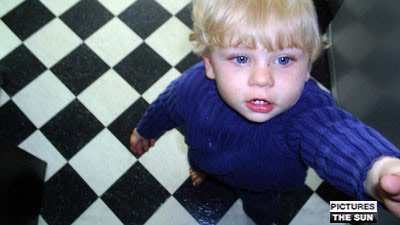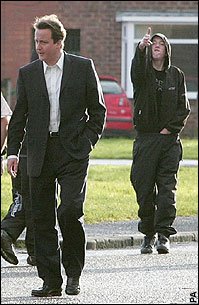The path from angels to demons.

 One of the reasons why the outpouring of outrage over the death of Baby P has been so understandable is his age. Defenceless, tiny and attractive, his treatment has been all the more intolerable because of the three of those things. Statistics tend to show that it's babies and in fact older children (older than the 8 that Victoria Climbié was when she was killed) that are the most likely to abused and murdered. Whilst however we treat babies as angels, the demonisation of older youths has been highlighted by a poll carried out by YouGuv on behalf of Barnardo's.
One of the reasons why the outpouring of outrage over the death of Baby P has been so understandable is his age. Defenceless, tiny and attractive, his treatment has been all the more intolerable because of the three of those things. Statistics tend to show that it's babies and in fact older children (older than the 8 that Victoria Climbié was when she was killed) that are the most likely to abused and murdered. Whilst however we treat babies as angels, the demonisation of older youths has been highlighted by a poll carried out by YouGuv on behalf of Barnardo's.While we ought to be wary to an extent of polls commissioned on behalf of such non-neutral organisations and of the questions asked, the results should surely still give us cause for alarm. 54% of the 2,021 questioned agreed that children were "beginning to behave like animals", 49% agreed that children are increasingly a danger to each other and adults, 43% agreed that something had to be done to protect us from children, 35% believed the streets are infested with children, 45% thought that feral was a perfectly acceptable way to describe children because they behave that way, and 49% disagreed with the statement that children that get into trouble are often misunderstood and in need of professional help.
Perhaps indicative of the increasing ill-regard to how children are described, troubled or not, was the reporting of the news that 4,000 under-sixes had been excluded from school in the past year. The Sun, in the summary of the story on its main page, described them, typically, as "yobs", probably for reasons of shortness, as the article more accurately calls them tiny terrors. These are children which are only a few years older than Baby P, who will typically often get involved such scrapes, unlikely to do much damage to each other, let alone an adult, and they were already being caught under such a completely unhelpful catch-all term.
Barnardo's also notes that the British Crime Survey recently found that almost 50% thought that half of all crime was committed by young people, while in actuality just 12% was. While we can blame the media for much of the public perception of the young as yobs or worse, some of the blame also has to been taken by the government which has done so much to promote the tackling of "anti-social behaviour". One of the questions asked of people to establish their view of how much is in their area is whether there are teenagers hanging around the streets (PDF). It doesn't matter what they're doing; just them hanging about is seen as one of the indicators of it. We've moved on it seems from the Victorian notion that children should be seen and not heard; now they should be neither.
Likewise, the fear that children are a danger to adults at least is an irrational fear. As can quickly be gleaned by examining those arrested and charged with the stabbings in London which have killed 22 teenagers there this year, the overwhelming number are being killed by their own peers. Children killing adults, or teenagers (one of those involved was over 18) such as the case of Garry Newlove which has been so used to portray the image of the country as broken, are far rarer. If we are to be judged on how we treat those that we incarcerate, then the picture is even bleaker, with one of the highest levels in Europe, without any evidence whatsoever to suggest that prison at such a young age either helps to rehabilitate or to bring actual crime levels down.
The 49% figure, which is open to misinterpretation (do they disagree with them needing professional help or being misunderstood?) is undoubtedly the most troubling. If 49% are already writing off those that get into any sort of trouble, when the vast majority will at some point during their upbringing do just that, then the intolerance we have towards the young is most likely beyond anything in the past. MushKush noted that over the past weekend people will have been donating to Children in Need, with their money likely to be used to help those that that they equally think are not misunderstood and not in need of professional help. One in five teachers asked a couple of months ago thought that the cane should be brought back to help re-establish discipline in the classroom; what is the difference between the thrashings that used to be administered to unruly children and the abuse that we now so rigorously condemn? Why is the hitting of children more acceptable to some when doing the same to another adult would be rightly considered to be assault?
Part of the fear of children is psychological. Like the Roman emperors, with help from the tabloids, we imagine that our children are going to be the ones that are going to get rid of us. When it comes to a battle between youth and experience, at the moment youth seems to be winning, even as our societies themselves inexorably age, with pensioners soon to outnumber the young for something approaching the first time. At the same time, the older generation are also being more called on to look after those children as the parents themselves go out to work, and with the government's determination to get mothers off benefits and into work earlier, this is likely to increase. None of this however seems to have softened our views towards the young; on the contrary, it seems to have hardened them. While the emphasis on knife crime, especially in London will have done little to help, the picture elsewhere is not so grim, yet it's cancelled out by the bias towards the Metropolitan and the demands for such apparently inexplicable slaughter to be halted.
Much like with everything else, the idea that the young are getting more ill-behaved goes hand in hand with the notion that everything is getting worse, even as we live longer and we enjoy wealth which our ancestors could only dream of, even if things could most certainly be a lot better. As Kim Catcheside points out, both Plato and a magistrate from 1898 believed that children's behaviour was worsening, based as always on their own personal experience. Again though, surveys tend to suggest that we actually think that our personal experience of the young, as with crime and the health service is rather good. It's outside of our bubbles that we think things are much worse.
The irony is that as we demand justice for Baby P, we ignore and castigate those slightly older but who we think should know better. Perhaps David Cameron in this instance is actually being more consistent than the government: having advised parents and others to show children a lot more love, which Labour promptly span as being to "hug a hoodie", he's been continuing the theme, if with more party political intent today. As Dr Chris Hanvey wrote five years ago, as long as we continue to have this deep ambiguity about children, splitting them off into villains and angels, we are unlikely to stop the tide of abuse. Consistency is something that very few manage, and it's not likely to be the result of the current witch-hunt.
Labels: Baby P, Barnardo's, child abuse, child protection, demonisation, media analysis, youth crime

